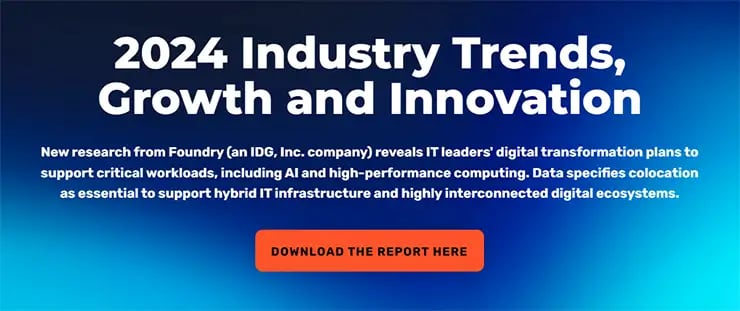
How Small Businesses Benefit from Colocation
CoreSite is ready to provide colocation services for any sized company. In fact, CoreSite’s multi-tenant data centers are designed to support small “retail” deployments as well as large “wholesale” deployments.
Data is critical to many of the 33.2 million small businesses in the U.S.1, and a data center is an essential asset, but small and medium-sized enterprises (SMEs) face several challenges when running their own data centers. In this blog, we show how colocation can be the right data center solution for small businesses.
Data Center Colocation Advantages for Small Businesses
By utilizing a colocation provider, an SME can basically outsource its data center, and gain access to enterprise-class availability, redundancy, scalability, expertise and security, while saving money. Let’s look at each of these advantages in more detail.
High Availability and Redundancy: Ideally, a data center should be always-on, but for many companies with in-house data centers this is not the case. To be sure, data center outages are common. According to the 2022 Data Center Resiliency Survey from Uptime Institute, “80% of data center managers and operators have experienced some type of outage in the past three years.”2
Small businesses do not usually lose millions of dollars per hour from outages like large corporations. Indeed, as Atlassian explains, “The truth is that while smaller companies may face smaller losses during a major incident, those smaller numbers can have an even bigger effect on their bottom line.”3
The U.S. Chamber of Commerce warns that having resilience after an unplanned crisis or natural disaster is one of the top challenges faced by a small business.1 The keys to maintaining availability and business continuity are data center redundancy and a reliable internet connection. And, colocation can cost-effectively deliver on both requirements.
On-Demand Scalability: One of the greatest challenges hindering any on-premises data center is scalability; the only way to increase scalability is to throw more hardware at the problem, which is not financially feasible for many SMEs, and it usually is not a practical strategy either. If you are not using all that computing power all the time, you are paying for idle servers.
Conversely, two of the most compelling advantages of colocation are on-demand scalability to support your growth or quickly scale up to meet customer demand. And the best part is that you only pay for what you use.
Strong Security: Data center security is a 24-hour commitment. Operating an on-premises data center requires security that many SMEs do not have the budget or in-house expertise to achieve.
Data center colocation can provide a small company with the same level of security as a major corporation. For example, CoreSite employs access key cards, biometric scanners, perimeter and interior cameras, secure facility design features, and 24x7x365 security personnel to protect your data.
Expert Support: A full staff of experts is needed to maintain a data center, performing tasks such as server installation and maintenance, power and cooling management, and security. Human resource limitations can make it difficult for a small business to manage an on-premises data center. Fortunately, a colocation provider can take on these responsibilities for you. For example, CoreSite supports small businesses by providing highly trained on-site technicians and consultants, available as an extension of your team.
Cost Savings: The most important advantage a small business will gain from colocation is reduced costs. Building and operating an on-premises data center – including the costs of power, cooling, maintenance and physical security – make this a cost-prohibitive proposition for many small businesses, and it is only going to get worse. Uptime Institute advises, “Ongoing supply chain issues and rising labor, energy and capital costs all set to make building and running data centers more expensive in 2023 and beyond.”4
Using colocation, you can turn a major capital expense into a more economical and predictable operating expense.
Types of Small Businesses That Benefit from Colocation
The following are just a sample of industries that can benefit from data center colocation:
Artificial Intelligence: AI is one of the hottest technologies today. But it can be challenging to gain access to the massive compute power needed to train and run AI models. OpenAI, the company behind ChatGPT, says computing power is one of the three factors that drive the advance of AI.4
Scale up as needed with on-demand compute power.
Software: A multitude of software startups emerge every year, and some of them will become tomorrow's tech giants – but today they have to start out as small businesses.
Off-load data center management and concentrate on your core competency – developing innovative software solutions.
E-Commerce: Availability of apps or websites can make or break an e-commerce company.
Leverage 100% uptime and easy scalability to serve customers 24/7.
Financial Services: The finance industry is undergoing a digital revolution with Fintech, empowering smaller companies to transform traditional processes to increase productivity, improve customer service and grow revenue.
Depend on low-latency connectivity that bypasses the public internet, for secure transactions and data transmission.
Healthcare: The security of patient data is a primary concern for healthcare providers, especially when they do not have access to a secure data center.
Add an extra layer of security to protect patient data and ensure regulatory compliance.
Solving the Data Center Dilemma
SMEs face a data center dilemma – they depend on data but do not always have the funds or staff to build and manage their own IT infrastructure. Data center colocation is the answer. CoreSite colocation provides all the advantages of owning an in-house data center, without all the challenges.
Ready to bring colocation into your business? You can get started simply by requesting a quote directly at www.coresite.com.








